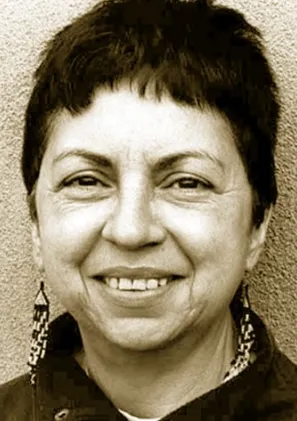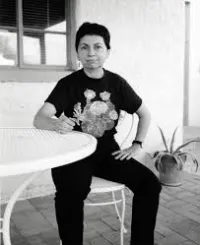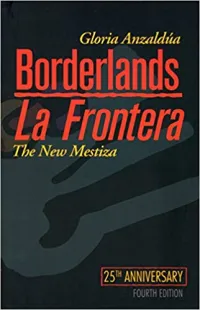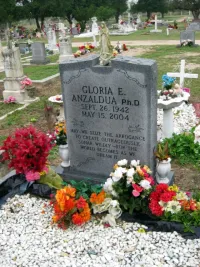Biography
1942 - 2004
“A woman who writes has power, and a woman with power is feared.”
– Gloria Anzaldúa
Gloria E. Anzaldúa was a guiding force in defining the contemporary Chicano/Chicana movement and a leader in lesbian and queer theory and identity. Born in southern Texas in 1942, she supported herself through her writing, lectures, and occasionally teaching courses in feminism, Chicano studies, or creative writing. She is perhaps best known for co-editing This Bridge Called My Back: Writings by Radical Women of Color (1981) with Cherri Moraga, a groundbreaking publication not only as a collection by feminists of color, but also for confronting the racism/classism found at the time in feminist thinking. The collection is also noteworthy for fully embracing lesbian voices and concerns and making a clear case that feminism should be inclusionary. Anzaldua also edited the follow-up volume Making Face: Making Soul/Hacienda Caras: Creative and Critical Perspectives by Women of Color (1990). Voted one of the 100 Best Books of the Century by both The Hungry Mind Review and Utne Reader, her semi-autobiographical book, Borderlands/La Frontera: The New Mestiza (1987), explored the borders between countries, languages, genders, the classes, and even within oneself. She also wrote several bi-lingual children’s books and co-edited This Bridge We Call Home: Radical Visions for Transformation (2002). Anzaldua described herself as a lesbian in her writings but also spoke about the limiting quality of labels for herself and others. She was against all things that separated people. For her, inclusion was essential in the LGBTQ+ movement as well. She was one of the first to champion the “otherness” of the queer movement. The recipient of numerous accolades and awards, she died in 2004 from complications due to diabetes.
1942 - 2004
“A woman who writes has power, and a woman with power is feared.”
– Gloria Anzaldúa
Gloria E. Anzaldúa was a guiding force in defining the contemporary Chicano/Chicana movement and a leader in lesbian and queer theory and identity. Born in southern Texas in 1942, she supported herself through her writing, lectures, and occasionally teaching courses in feminism, Chicano studies, or creative writing. She is perhaps best known for co-editing This Bridge Called My Back: Writings by Radical Women of Color (1981) with Cherri Moraga, a groundbreaking publication not only as a collection by feminists of color, but also for confronting the racism/classism found at the time in feminist thinking. The collection is also noteworthy for fully embracing lesbian voices and concerns and making a clear case that feminism should be inclusionary. Anzaldua also edited the follow-up volume Making Face: Making Soul/Hacienda Caras: Creative and Critical Perspectives by Women of Color (1990). Voted one of the 100 Best Books of the Century by both The Hungry Mind Review and Utne Reader, her semi-autobiographical book, Borderlands/La Frontera: The New Mestiza (1987), explored the borders between countries, languages, genders, the classes, and even within oneself. She also wrote several bi-lingual children’s books and co-edited This Bridge We Call Home: Radical Visions for Transformation (2002). Anzaldua described herself as a lesbian in her writings but also spoke about the limiting quality of labels for herself and others. She was against all things that separated people. For her, inclusion was essential in the LGBTQ+ movement as well. She was one of the first to champion the “otherness” of the queer movement. The recipient of numerous accolades and awards, she died in 2004 from complications due to diabetes.
Lesson Plan
Please login or register for an account to view this lesson plan.
Demography
Demography
Gender Female
Sexual Orientation Lesbian
Gender Identity Cisgender
Ethnicity Latinx
Faith Construct Agnostic
Nations Affiliated United States
Era/Epoch Information Age (1970-present) Second-wave Feminism (1960-1990) Third-wave Feminism (1990-2012)
Field(s) of Contribution
Advocacy & Activism
Art, Music, Literature & Theater
Author
Education
Journalism
Lecturer
Media & Communications
Poet
Social Justice
Social Sciences
US History
Commemorations & Honors
Gloria E. Anzaldúa Poetry Prize Awarded Annually in Conjunction with the Anzaldúa Literary Trust
Gloria E. Anzaldúa Book Prize Awarded Annually by the National Women's Studies Association
Before Columbus Foundation American Book Award For This Bridge Called My Back: Writings by Radical Women of Color (1986)
Lambda Lesbian Small Book Press Award (1991)
National Endowment for the Arts Fiction Award (1991)
American Studies Association Lifetime Achievement Award Bode-Pearson Prize (2001)
Society for the Study of Gloria Anzaldúa Established (2007)
Google Doodle Commemorating Anzaldúa's 75th Birthday (2017)
Demography
Gender Female
Sexual Orientation Lesbian
Gender Identity Cisgender
Ethnicity Latinx
Faith Construct Agnostic
Nations Affiliated United States
Era/Epoch Information Age (1970-present) Second-wave Feminism (1960-1990) Third-wave Feminism (1990-2012)
Field(s) of Contribution
Advocacy & Activism
Art, Music, Literature & Theater
Author
Education
Journalism
Lecturer
Media & Communications
Poet
Social Justice
Social Sciences
US History
Commemorations & Honors
Gloria E. Anzaldúa Poetry Prize Awarded Annually in Conjunction with the Anzaldúa Literary Trust
Gloria E. Anzaldúa Book Prize Awarded Annually by the National Women's Studies Association
Before Columbus Foundation American Book Award For This Bridge Called My Back: Writings by Radical Women of Color (1986)
Lambda Lesbian Small Book Press Award (1991)
National Endowment for the Arts Fiction Award (1991)
American Studies Association Lifetime Achievement Award Bode-Pearson Prize (2001)
Society for the Study of Gloria Anzaldúa Established (2007)
Google Doodle Commemorating Anzaldúa's 75th Birthday (2017)
Resources
Resources
Alarcón, Norma. "Chicana Feminism: In the Tracks of the 'Native Woman.'" Cultural Studies 4.3 (1990): 248-256.
Baldwin, Elizabeth. Interview with Anzaldúa. Matrix (May 1988): 1-33.
Freedman, Diane P. "Writing in the Borderlands: The Poetic Prose of Gloria Anzaldúa and Susan Griffin." Constructing and Reconstructing Gender: The Links Among Communication, Language, and Gender. Linda A. M. Perry, Lynn H. Turner, and Helen M. Sterk, eds. Albany: SUNY Press, 1992. 211-217.
Keating, AnnLouise. Women Reading Women Writing; Self-Invention in Paula Gunn Allen, Gloria Anzaldúa, and Audre Lorde. Philadelphia: Temple University Press, 1996.
Saldívar-Hull, Sonia. "Feminism on the Border: From Gender Politics to Geopolitics." Criticism in the Borderlands: Studies in Chicano Literature, Culture, and Ideology. Héctor Calderón and José David Saldívar, eds. Durham: Duke University Press, 1991. 203-220.
Smith, Sidonie. "The Autobiographical Manifesto: Identities, Temporalities, Politics." Autobiography and Questions of Gender. Shirley Neuman, ed. London: Frank Cass, 1991. 186-212.
Torres, Héctor A. "Gloria Anzaldúa." Dictionary of Literary Biography, Volume 122: Chicano Writers. 2nd series. Francisco A. Lomelí and Carl R. Shipley, eds. Detroit: Brucolli-Gale, 1992. 8-17.
http://womenshistory.about.com/od/feministpoetry/a/gloria_anzaldua.htm
https://qspirit.net/gloria-anzaldua-queer-spiritual-activism/
https://www.literaryladiesguide.com/author-biography/gloria-e-anzaldua/
https://msmagazine.com/2011/10/04/queer-history-month-remembering-gloria-anzaldua/
https://poetry.arizona.edu/blog/interview-gloria-anzald%C3%BAa
https://www.chicagotribune.com/news/ct-xpm-2004-05-26-0405260231-story.html
https://www.poetryfoundation.org/poets/gloria-e-anzaldua
https://legacy.lib.utexas.edu/taro/utlac/00189/lac-00189.html
Resources
Alarcón, Norma. "Chicana Feminism: In the Tracks of the 'Native Woman.'" Cultural Studies 4.3 (1990): 248-256.
Baldwin, Elizabeth. Interview with Anzaldúa. Matrix (May 1988): 1-33.
Freedman, Diane P. "Writing in the Borderlands: The Poetic Prose of Gloria Anzaldúa and Susan Griffin." Constructing and Reconstructing Gender: The Links Among Communication, Language, and Gender. Linda A. M. Perry, Lynn H. Turner, and Helen M. Sterk, eds. Albany: SUNY Press, 1992. 211-217.
Keating, AnnLouise. Women Reading Women Writing; Self-Invention in Paula Gunn Allen, Gloria Anzaldúa, and Audre Lorde. Philadelphia: Temple University Press, 1996.
Saldívar-Hull, Sonia. "Feminism on the Border: From Gender Politics to Geopolitics." Criticism in the Borderlands: Studies in Chicano Literature, Culture, and Ideology. Héctor Calderón and José David Saldívar, eds. Durham: Duke University Press, 1991. 203-220.
Smith, Sidonie. "The Autobiographical Manifesto: Identities, Temporalities, Politics." Autobiography and Questions of Gender. Shirley Neuman, ed. London: Frank Cass, 1991. 186-212.
Torres, Héctor A. "Gloria Anzaldúa." Dictionary of Literary Biography, Volume 122: Chicano Writers. 2nd series. Francisco A. Lomelí and Carl R. Shipley, eds. Detroit: Brucolli-Gale, 1992. 8-17.
http://womenshistory.about.com/od/feministpoetry/a/gloria_anzaldua.htm
https://qspirit.net/gloria-anzaldua-queer-spiritual-activism/
https://www.literaryladiesguide.com/author-biography/gloria-e-anzaldua/
https://msmagazine.com/2011/10/04/queer-history-month-remembering-gloria-anzaldua/
https://poetry.arizona.edu/blog/interview-gloria-anzald%C3%BAa
https://www.chicagotribune.com/news/ct-xpm-2004-05-26-0405260231-story.html
https://www.poetryfoundation.org/poets/gloria-e-anzaldua
https://legacy.lib.utexas.edu/taro/utlac/00189/lac-00189.html






